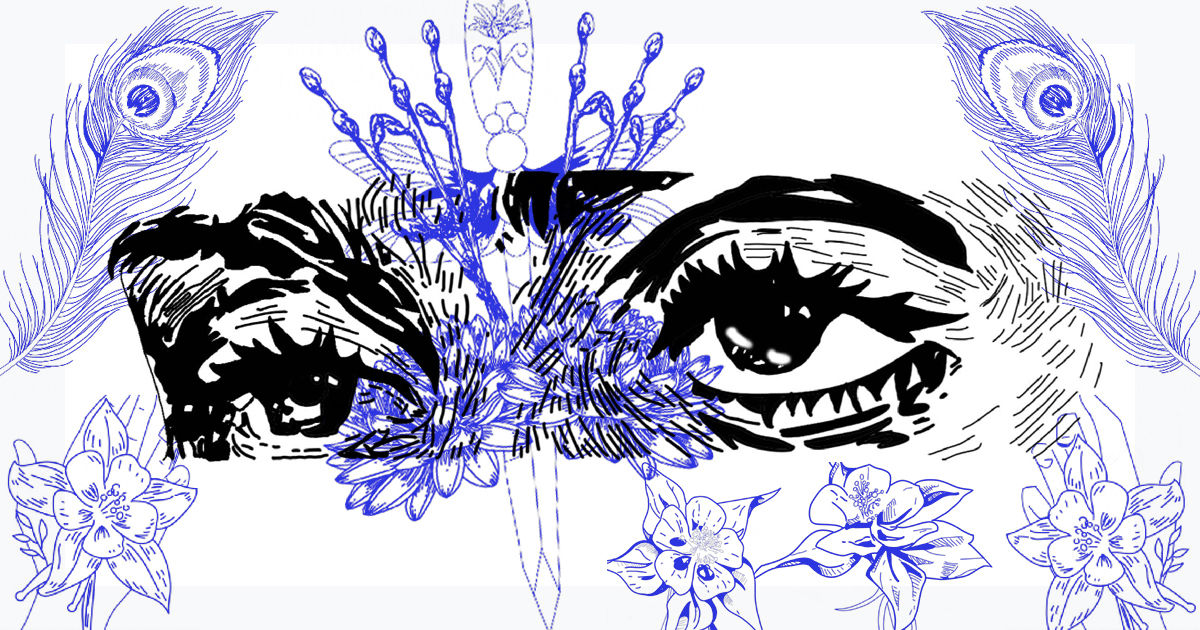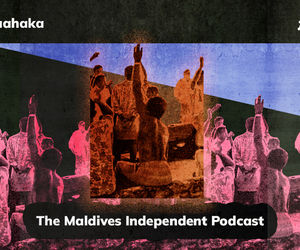Thrice betrayed: a rape survivor's fight against institutional indifference in the Maldives
Survivors face a system as traumatic as their assault.

Artwork: Dosain
09 Apr 2025, 12:54
Aisha Hanaan Ali’s memories of her rape come in fragments, like a nightmare she cannot fully piece together. Her life was brutally upended close to midnight on October 21, 2023. It happened in Villimalé, a small and sleepy island suburb of the capital Malé where the 28-year-old teacher lived.
After a belated birthday celebration in Hulhumalé, Hanaan was heading back with some leftover food. She texted her mother and a friend to let them know when she got off the ferry. When the bus was late, she decided to walk and take a shortcut home through a wooded clearing – a dusky thicket where shadows pooled between dense tree trunks – hoping to feed one of three beloved cat colonies on the well-worn footpath.
But before she could find any cats, two men came up from behind and grabbed her.
“I remember being dragged through the trees. And my cane, my bag, my phone and even the leftover pasta, everything was all over the place. And my pants were down. The bra and sleeve of my shoulder were down, and then I knew I was assaulted,” she recounted to the Maldives Independent.
“I didn't even know that I was in pain or anything. I knew I was in pain but it didn’t really register. It still hasn’t registered. I still don’t have all of the memories. It's been a long process to unblock everything,” she recalled, noting how eye movement desensitisation and reprocessing (EMDR) therapy helped process the traumatic experience.
The aftermath of Hanaan’s rape laid bare systematic failures in handling sexual assault. Despite legal reforms mandating the use of rape evidence kits and applying a “victim-centred and trauma-informed” approach, the police conduct highlighted persistent gaps between legislation and reality.
Police officers arrived late to the scene, encouraged her to go home and shower, lost crucial CCTV footage, and required her to relive her trauma four separate times. Nearly a year and a half later, no charges have been raised despite a positive identification from a lineup.
The damning procedural breakdowns mirrored what the UN Committee on the Elimination of Discrimination against Women identified as barriers to justice: "discriminatory gender stereotypes among police officers, gender-insensitive investigation methods, and lack of protection for women who report rape."
A dismal conviction rate underscores this systemic failure. From January 2022 to the present, 998 sexual offences were reported to the police, which forwarded 24 cases of rape for prosecution. Charges were raised in 10 cases, only three of which resulted in convictions.
Second trauma
“The first thing I did was pick up the phone, but first I needed to find my phone. I didn't even have my glasses, I couldn't see anything without them,” Hanaan continued.
She remembered hearing footsteps from people walking past. “I tried calling out but I don’t think they heard me, probably thought I was a cat or something,” she said.
When she finally found her phone, the first person she called was her mother. Her mother and brother rushed from Malé, calling the police on the way, and found her still lying on the ground.
Three police officers arrived later but they “didn't do anything, they just stood around looking at me,” Hanaan said, describing how they watched as her brother tried to carry her to the nearby hospital.
“I couldn't stand up at all so my brother carried me. And halfway there, my brother started yelling at the police because they had a buggy [electric vehicle] and they were [following us] on that and just watching everyone do everything, so my brother said, ‘at least use the buggy to take her,’ and they were like ‘oh yeah.’”
At the Villimalé hospital, the doctor recommended immediate transfer to the Indira Gandhi Memorial Hospital for a sexual assault forensic exam, better known as a rape kit. But the police officers insisted on waiting for a case worker from the gender ministry, who was not responding to calls.
As Hanaan waited, one of the police officers advised her repeatedly to go home: “It’s going to take a long time tonight. I don’t think it can be done tonight. Why don’t you go home? Go home, rest, shower and come back tomorrow?”
But she knew showering could destroy crucial forensic evidence and her mother “yelled and screamed” until the police finally took her to Malé.
Even at the gynecologist at IGMH, the police refused to let her do the rape kit until the case worker could come. But hospital workers intervened and told the police officers that the case worker’s presence was not required. No one else apart from the doctor would be allowed inside the room, they said.
“So they did the rape kit on me and at that point, four to five hours later, we realise that I’m bleeding,” Hanaan said. She underwent blood tests and received treatment. Forensic police officers came around 7am, took photos of her and bagged her clothes as evidence.
The hospital wanted her to be admitted for observation. But after the ordeal of the tests and rape kit, she wanted to go home.
When she finally reached her apartment, Hanaan broke down, alone, afraid and anxious.
“I finally tried to take a shower but every time I tried to take my clothes off I’d remember everything that had happened. I couldn't look at my own body and I felt disgusted by everything that happened. I felt very disconnected from my body as well. And at some point, I got so anxious about everything, I called my mum.”
When her mother arrived, Hanaan was holding a knife with her back against the wall, watching all the entrances.
She was taken back to IGMH and admitted to the psychiatry ward, where the doctors and counsellors, “they genuinely helped me back on my feet.”
Third betrayal
Hanaan is reasonably certain about the identities of the two rapists. She first met them through a friend shortly after moving to Villimalé in 2022. She was introduced to the two men at their workplace just a few blocks from her home.
The initial interactions were nice but sexual harassment soon followed.
“They joke, like ‘how do you like this woman eh, how do you like that woman.’ Talking about our body parts. What it would feel like. Talking about how they would like to assault us. Talking about molesting our body parts,” she said.
When her friend stood up to the two men, the harassment escalated to catcalling, whistling and calling out to her as she walked past their workplace. Two weeks before the assault, she reported the harassment to their female boss, which led to a verbal confrontation with one of the men, who reacted furiously to her complaints.
During the police investigation, when she was shown photos of several men whose faces all looked alike, Hanaan was able to identify her assailant.
Hanaan was summoned to the police station to provide a statement four different times. Despite the multiple rounds to establish the “chain of events” from the night, the police failed to question the perpetrator she identified, according to Hanaan.
Frustrated by the lack of progress, her “powerhouse” mother and brother took it upon themselves to investigate, checking the scene for footprints the next day and questioning police about any CCTV footage available from Villimalé.
One footprint was smudged by the police buggy. The camera footage was “corrupted” and unusable, police informed them a few weeks later.
But the police did facilitate psychological help, “which did help me quite a bit, my therapist was amazing,” Hanaan noted.
The Maldives Independent has been awaiting a response from the police to detailed questions sent on Monday morning. A police spokeswoman said she was only authorised to provide information about specific cases but could not comment regarding police protocols or legal responsibilities.
A regulation on protocols for the use of rape evidence kits mandated by the December 2021 amendments to the Sexual Offences Act within two months has yet to be gazetted three years later, a health ministry spokeswoman confirmed. But a draft has been shared with the Attorney General’s Office, she said.
Discussion
No comments yet. Be the first to share your thoughts!
No comments yet. Be the first to join the conversation!
Join the Conversation
Sign in to share your thoughts under an alias and take part in the discussion. Independent journalism thrives on open, respectful debate — your voice matters.




